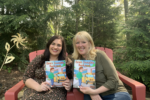Authentic representation of disability in media is so important. It ensures that children grow up with role models who experience the world in relatable ways. It normalizes difference and disability as a natural, valuable part of human existence. In honor of Jewish Disability Month, we compiled another list of some of our current favorite books on disability and inclusion for children and young adults of all ages.
Ages 0-2: “On-The-Go” by Brook Sitgraves Turner and Archaa Shrivastav
This board book is full of beautiful photos featuring children with various disabilities and mobility aids, offering an opportunity for our youngest children to see bodies that are similar to and different from their own and to ask questions without stigma or judgement. See another book in the same series, “How We Eat,” to continue the conversation with your little one.
Ages 3-5: “More than Words, So Many Ways to Say What We Mean” by Roz MacLean
A stunning depiction of communication diversity, this newly-released book emphasizes that everyone has something to say, even if they do not communicate in traditional ways. People may communicate in different ways—through body language, sign language, facial expressions, singing, writing, speaking, and more—but we all share a desire for connection and to be understood. With an educational guide in the back, this book is a wonderful conversation-starter about ensuring that all members of our community have access to meaningful communication.
Grades K-2: “Can Bears Ski?” by Richmond Antrobus and Polly Dunbar and “A Day with No Words” by Tiffany Hammond
Both of these new titles released in 2023 are excellent; I couldn’t pick just one! Written by authors with authentic lived experiences of the disabilities depicted, these books are what those authors wish they’d had on their bookshelves when they were younger.
In “Can Bears Ski?,” readers follow along as the protagonist experiences the world through his senses, visits an audiologist, and tries out hearing aids for the first time.
In “A Day with No Words,” readers are introduced to a day in the life of an Autistic family that communicates using various Augmentative and Alternative Communication (AAC) tools.
Grades 3-5: “I Am Not a Label: 34 Disabled Artists, Thinkers, Athletes and Activists from Past and Present” by Cerrie Burnell
Filled with short, illustrated biographies of iconic figures from past and present, this resource offers many opportunities for student learning. Try using the jigsaw method—break students up into small groups and assign each group one biography to read and discuss together. Then mix up the groups and have the students share what they learned with their peers. Alternatively, use this resource as the jumping-off point for a longer project: assign each student to research a different individual and represent their learning in a way that is exciting and meaningful to them. Filled with many different representations of varied life experiences, this book is sure to challenge preconceived notions of disability and mental health.
Grades 6-8: “Insignificant Events in the Life of a Cactus” by Dusti Bowling
This book has great disability representation, specifically Tourette’s and limb differences, as well as a plot that doesn’t center around disability. Follow along as Aven Green, who was born without arms, moves across the country, navigates the challenges of middle school, makes new friends, and encounters a tantalizing mystery. Readers will appreciate the protagonist’s sense of humor and become quickly engrossed in the story’s mystery plot.
Grades 9-12: “Disability Visibility (Adapted for Young Adults)” by Alice Wong
Adapted specifically for a young adult audience from Wong’s original collection of first-person stories, this book is another vital contribution to ensuring that all youth see themselves reflected in literature. This collection of essays encourages readers to consider the disability experience through multiple lenses. Topics explored include ableism, healing, isolation, physical access, mental health, communication access, power, and much more.
This post has been contributed by a third party. The opinions, facts and any media content are presented solely by the author, and JewishBoston assumes no responsibility for them. Want to add your voice to the conversation? Publish your own post here. MORE









